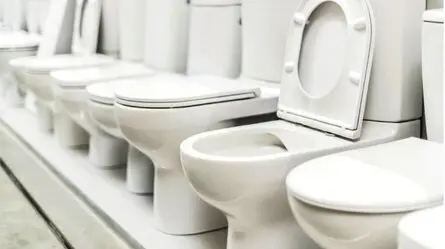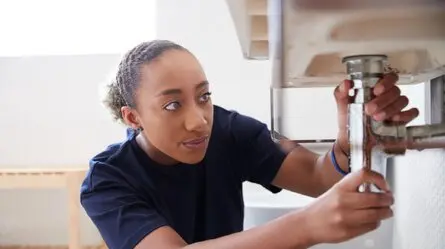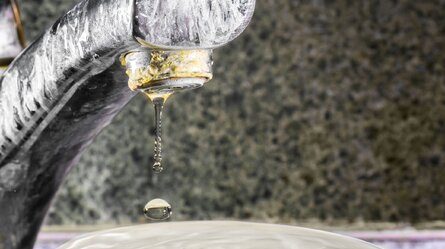
Plumbing is a hands-on career essential to keeping buildings running. Plumbers must complete specialised training and certification, but they don’t require a university degree.
This article breaks down what you need to become a licensed plumber. We’ll dive into the education requirements, apprenticeship details, and the testing and licensing process. Knowing these steps is vital for anyone thinking about a career in this high-demand field.
Let’s begin with the usual educational background needed for plumber apprenticeships. After that, we’ll look into the stages of training, certification, and licensing required to become a professional plumber.
Educational Requirements
To embark on a plumbing apprenticeship program and become a licensed or registered plumber, you’ll typically need to meet some baseline educational qualifications. Most plumber apprenticeships accept applicants who have a high school diploma or GED.
.jpg)
While you don’t need a post-secondary degree, having some vocational training or courses in maths, science, and technical skills can boost your competitiveness. Practical skills like working with tools and problem-solving are valuable assets to have.
The critical educational requirement is a high school credential demonstrating your ability to learn technical skills and work towards longer-term goals.
Certification and Licensing
After completing an apprenticeship program, most states require plumbers to obtain certification and licensing to legally work independently. The type of certification or license needed depends on the specific work activities.
Residential plumbers usually need a Master or Journeyman certification, whereas commercial plumbers face extra requirements. They also have to renew their licenses regularly by earning continuing education credits.
.jpg)
In Australia, all plumbers are required to complete the Certificate III in Plumbing course, which is available through various educational institutions and training centres. During the course, aspiring plumbing professionals learn everything they need about the plumbing trade, planning and executing work, and site safety.
Plumbers must pass licensing exams focused on plumbing codes, installation procedures, safety practices, and more. State regulatory agencies administer exams.
Maintaining active licenses proves to customers and employers that plumber skills meet standards. Certification helps protect public health and confirms plumbers can perform tasks responsibly.
Desirable Skills for Plumbers
Alongside technical skills gained through education and experience, some soft skills also benefit plumbers in their careers. Problem-solving is critical, as plumbers often face unexpected issues and need to troubleshoot efficiently.
Physical stamina is essential for managing long hours on your feet in challenging conditions. Strong communication skills allow plumbers to clearly explain plumbing systems and maintenance needs to customers. Attention to detail will enable issues to be noticed.
.jpg)
Plumbers also benefit from skills like quick learners, following codes and instructions precisely, and having good manual dexterity for handling tools and making precise adjustments or repairs. Customer service skills help create positive client relationships and obtain referrals.
Plumbers relying on these complementary talents can work more effectively and achieve high plumbing work satisfaction.
Frequently Asked Questions About Plumbing Qualifications
What is a plumber?
A plumber is a licenced trades professional who installs and repairs pipes that carry water, steam, air, or other liquids and gases. They also work with roofing and air-conditioning (HVAC) ventilation and the service and repair of gas appliances.
Plumbers work on various fixtures found in homes, businesses, and factories. They usually travel to worksites to perform their duties. Plumbers are highly trained in their trade and heavily relied upon by their customers for a range of sometimes urgent services.
Do I need experience to become a plumber?
While prior plumbing experience is not required, it can be beneficial. However, an accredited apprenticeship program will provide all the hands-on training and experience needed over multiple years under licensed plumbers to prepare for licensing exams and a career as a professional plumber.
Can plumbers specialise in a specific type of plumbing?
Definitely. Plumbers can specialize in areas like service and repair, water conditioning, water heaters, septic systems, drain systems, or even green plumbing technologies. Specializing often means getting extra certifications.
.jpg)
What types of plumbing jobs are available?
Some common career paths in the plumbing industry include commercial and residential plumbing installation, repair, and service work. Other options are pipefitting, drain cleaning, water system installation and maintenance, plumbing for fire protection systems, and more specialised areas like medical gas systems.
There is room for specialisation in different industry sectors and opportunities for self-employment as plumbing contractors. To work as a plumber within the construction industry, you must obtain a Construction Induction Card (also known as a “white card”) from a registered training organisation authorised by the WorkSafe Division of the Department of Mines, Industry Regulation and Safety.
Is health insurance required for plumbers?
Plumbing jobs often require lifting heavy objects and working in tight spaces, which can be physically demanding. For this reason, many plumbing companies provide health insurance plans to their employees.
What are some plumbing specialisations I can pursue?
Some focus areas include plumbing services or repair work, pipefitting, water systems, septic systems, drain cleaning, hydrojetting, medical gas systems, gas fitting, and plumbing within specific commercial industries like hospitals, schools, etc.
Starting Your Career as a Professional Plumber
Becoming a licensed plumber requires completing an accredited apprenticeship program, certification, and licensing requirements that vary by state. However, undertaking the process can lead to a rewarding career in an in-demand field. Plumbers have stable employment prospects with opportunities for advancement.
If you’re interested in pursuing plumbing as a profession, contact Woolf Plumbing. As an experienced plumbing company, we regularly hire qualified plumbers and apprentices. Our plumbing and gas qualifications cover common and specialist areas for the industry, including water, sanitary, drainage, mechanical services, roofing and gas services. Contact us online or call us to discuss whether plumbing is the right fit for your career goals. This hands-on trade can be very fulfilling with the proper qualifications and training.




